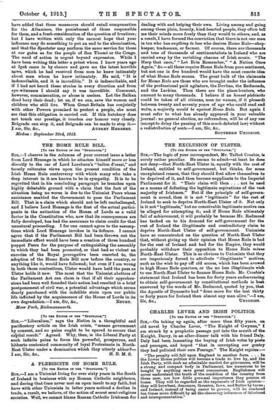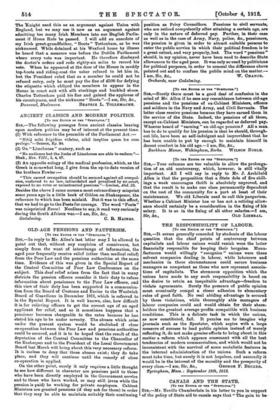CHARLES LEVER AND IRISH POLITICS. [To THE EDITOR OP THE
" SPECTATOR."] SIR,—On taking up again, after more than fifty years, an old novel by Charles Lever, " The Knight of Gwynne," I am struck by a prophetic passage put into the mouth of the Knight, Darcy, in an after-dinner talk with his friend Daly. Daly had been lamenting the buying of Irish votes by posts and peerages, and hoped " that in corrupting our gentry they had polluted their own Peerage." The Knight rejoins "The penalty will fall upon England in another form.. . . In the Lower House politics will become a trade to live by, and the Irish Party, with such an admirable market for grievances, will be a strong and compact body in Parliament, too numerous to be bought by anything save great concessions. Englishmen will never understand the truth of the condition of the country from these men, nor how little personal importance they possess at home. They will be regarded as the exponents of Irish opinion— they will browbeat, denounce, threaten, fawn, and flatter by turns ; and Ireland, instead of being easier to govern, will be rendered ten times more difficult by all the obscuring influences of falsehood and misrepresentation." The 'knight used this as an argument against Union with England, but we may use it now as an argument against admitting too many Irish Members into our English Parlia- ment if Home Rule be passed. I will add an anecdote of my Irish great-grandfather, " Boots " Tottenham, as he was nicknamed. While detained at his Wexford home by illness he heard that a measure was before the Dublin Parliament where every vote was important. He therefore disobeyed the doctor's orders and rode eighty-six miles to record his vote. When he appeared at the door of the House in muddy top-hoots and riding-coat the usher refused to let him in, but the President ruled that as a member he could not be refused entry, only he must pay the fine of E.500 for defying the etiquette which obliged the members to appear in the House in court suit with silk stockings and buckled shoes. Charles Tottenham paid his fine and gained the applause of his countrymen, and the nickname " Boots."—I am, Sir, &c., Dunrozel, Haslemere. BEATRIX L. TOLLEMACHE.



































































 Previous page
Previous page